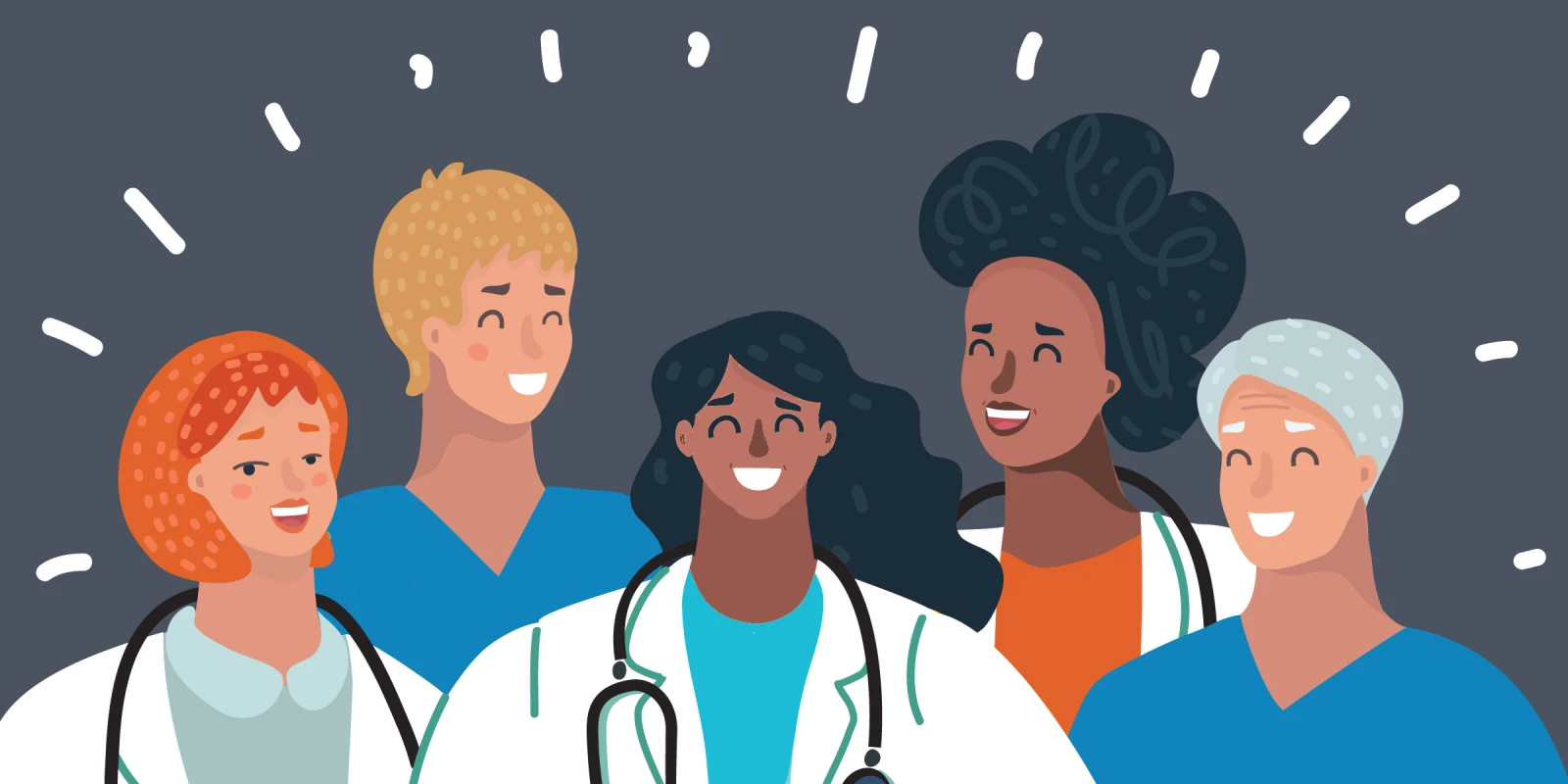I’m driving home at sunrise after an eventful night as the ICU resident. I take in the pink-orange hues spread out across the morning sky and ask myself the same question I’ve been asking daily: Are you happy today?
I think about my night, and yes, actually, I am happy in residency. This is quite profound, considering the events of my night and a bit of sleep deprivation. When I say I am happy, I do not mean that I am always happy. At the beginning of my third year in residency, I made a conscious decision to build a happy life while in residency.
How does one arrive at “happiness” in residency when the woe-is-me narrative is so easy to adopt? I define my markers of happiness with the following question: Do I have enjoyment, support, and purpose during this temporarily challenging season of my career?
It was a few minutes after 6:00 p.m. on my overnight ICU shift when the charge nurse flew into the resident workroom.
“Dr. Kuria, there’s a patient in ventricular fibrillation on telemetry. There’s still a pulse, but ...”
I grabbed my stethoscope and ran. As soon as I saw the ominous, distinct rhythm of torsades de pointes on the monitor above the intubated and sedated patient, I asked, “Is there still a pulse?”
The charge and primary nurse checked for a femoral and carotid pulse. They simultaneously shook their heads.
It officially became a cardiac arrest.
“Start chest compressions, place pads, and call a code blue,” I said aloud to the entourage of nurses, residents and respiratory therapists pouring in. I stood at the foot of the bed announcing, “I’m Dr. Kuria and I’m running this code.” As a short, Black girl often wearing shades of muted mauves or light lavender scrubs, I’ve made this a habit to avoid the confusion as to who I am.
“Time to pulse check?” I asked the primary nurse.
“30 seconds.”
“If there’s no pulse at the next pulse check, prepare to shock. Charge at 200 Joules,” I announced loudly.
“Pulse check!” The charge nurse exclaimed. There was no pulse and the rhythm was still showing ventricular fibrillation so I decided to shock.
“Resume compressions,” I said, as I checked if the defibrillator was charged. “Clear!” Once I was sure no one was touching the patient, I administered the shock. “Shock! Resume compressions!”
After two rounds of CPR and one shock, the patient had a pulse and was back in normal sinus rhythm.
“Yo, Dr. Kuria, that was a good code. Good job!” One of my favorite ICU nurses said as she gave me a high-five. “Why do you think it happened? He was fine. I mean, he was straight chillin’ all day.”
I launched into a short spiel on heart failure with reduced ejection fraction, aortic stenosis, stretched myocardium, and the risks of ventricular fibrillation in the absence of an implanted defibrillator.
“See, this is why she’s leaving us for cards fellowship next year.” My favorite respiratory therapist joins us. “Hey, Kuria, did you want a new blood gas by the way?”
“Yes, please, thank you.”
I retreated back to my workroom to place orders, document, and update the overnight cardiologist. I called the patient’s family and reassured them that their loved one was alive, but relayed that their heart stopped overnight and the steps we took to revive them. I allowed them a moment to digest that, letting my silence serve as a safe space for their tears. I let them know I’d be here all night if they had any questions.
By 3:00 a.m., I had finished ICU admissions for diabetic ketoacidosis, cardiogenic shock, and respiratory failure. I finally had a minute to sip my coffee and check my Three-is-Company text group. It’s made up of myself and two of my best friends from medical school — one is an anesthesiology residency in the Midwest and the other a psychiatry resident on the East Coast.
Me: “YOU GUYS. Are y’all awake? I am literally having the wildest night ever. Literally nonstop since I walked into a V. Fib arrest!”
I expect that they’re both asleep, but I want to vent. I see gray text bubbles and smile.
M: “Look at you little miss cardiologist! Did they make it?”
Me: “YES!”
P: “Dude, you got this. This is literally your thing.”
Me: “Awe, thanks you guys. Wait, why are you both awake?”
M: “I’m on psych ED nights. Wait ‘til I tell you about tonight.”
P: “I’m covering anesthesia nights.”
Me: “Lol, how are we all on nights?”
M: “Hahaha, how cute is this?”
Me: “Can we have a family FaceTime tomorrow?”
M: “Yes, let’s. So, Njeri, how are you really doing?”
I pause. I’m actually extremely sad. I’ve been putting it off though. I tell myself I’m saving my feelings for later because I need to be present for my patients. I can be completely honest here though.
Me: “You guys,*crying emoji* I’m absolutely gutted. I want to text him.”
P: “Njeri, it’s OK to be sad. Gotta run back to the OR. See you both on FaceTime tomorrow.”
M: “We love you, let’s talk tomorrow.”
Me: “OK, love you guys, laters.”
The ICU phone rings and I bury my personal life for a few more hours. By 6:00 a.m., I’m suturing a central line in place on a late admission before signing out to the day team resident.
Before I leave the hospital, I circle back to my cardiac arrest patient from the beginning of my shift. He’s intubated, but he’s awake and less sedated. I hold his hand and give it a warm squeeze. He opens his eyes and looks at me then squeezes. He then takes his other hand and puts it over the back of my hand, squeezing my hand in both of his. The endotracheal tube won’t allow him to talk, but I understand this gesture in more ways than any words could relay.
“Hi. I’m Dr. Kuria, do you remember me? You weren’t doing too well overnight, but you’re doing better. I just wanted to say goodbye, but I’ll be back tonight.”
He gives me a thumbs up. Then points to his chest.
“Yes, we had to shock your heart, that’s why it’s sore.”
He nods, then reaches for my hand again. He doesn’t let go, so I let him hold my hand until he’s ready to let go.
Do I have enjoyment, support, and purpose during this temporarily challenging season of my career?
Absolutely.
“Enjoyment” is fulfilled by challenging cases and working with people. I knew going into internal medicine that I’d be treating a wide array of diseases and juggling all kinds of personalities, including colleagues, ancillary staff, and patients. I thoroughly enjoy teamwork with supportive staff who not only respect my judgment, but are happy to learn from me and cheer me on after a code blue. There will be days when I find cases to be mundane or experience an unpleasant personality, but ultimately, these are few and far between, and I refuse to let those days define my residency experience. Unfortunately, there are residency programs where, no matter how hard you try, you will be unable to have a pleasant experience due to a malignant culture.
“Support” is fulfilled by my social connections, which include my friends and family, especially my best friends in medicine. I stress “in medicine” because they will understand moments in residency better than anyone else. I can shoot a 3:00 a.m. text about a wild night in the ICU and they will cheer me up or make me laugh. They’ll also dig even deeper and ask me how I’m really doing because they know I’m sad about a boy, but shelving my feelings until I’m home. This kind of support is imperative to building a happier life in residency, and arguably the most important marker of happiness. Dr. Robert Waldinger, who directs the Harvard Study of Adult Development, the longest scientific study of happiness ever conducted, said, “Good relationships keep us healthier and happier. Period. If you want to make one decision to ensure your own health and happiness, it should be to cultivate warm relationships of all kinds.”
“Purpose” enters my days unexpectedly and leaves me feeling like all the air has left my lungs. It’s in the moments where I feel like I’m just doing my job, and a patient who is intubated wants to hold my hand for a few more minutes as they try their best to relay gratitude through touch and tears. I allow those moments to reach inside and remind me of my why.
Have you found enjoyment, support, and purpose in residency?
Dr. Kuria is an internal medicine resident physician in Loma Linda, CA who’s passionate about preventing heart disease. She enjoys museums, traveling, and trying new vegetarian recipes. She tweets at @kuriascase. Dr. Kuria is a 2022-2023 Doximity Op-Med Fellow.
Image by cosmaa / Getty







